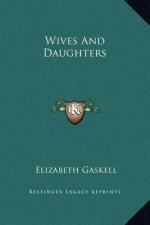but the interest to Government had to be paid all
the same, whether the men worked well or ill.
Then the roof of the Hall let in the melted snow-water
this winter; and, on examination, it turned out that
a new roof was absolutely required. The men who
had come about the advances made to Osborne by the
London money-lender, had spoken disparagingly of the
timber on the estate—’Very fine trees—sound,
perhaps, too, fifty years ago, but gone to rot now;
had wanted lopping and clearing. Was there no
wood-ranger or forester? They were nothing like
the value young Mr. Hamley had represented them to
be of.’ The remarks had come round to the
squire’s ears. He loved the trees he had
played under as a boy as if they were living creatures;
that was on the romantic side of his nature.
Merely looking at them as representing so many pounds
sterling, he had esteemed them highly, and had had,
until now, no opinion of another by which to correct
his own judgment. So these words of the valuers
cut him sharp, although he affected to disbelieve them,
and tried to persuade himself that he did so.
But, after all, these cares and disappointments did
not touch the root of his deep resentment against
Osborne. There is nothing like wounded affection
for giving poignancy to anger. And the squire
believed that Osborne and his advisers had been making
calculations, based upon his own death. He hated
the idea so much—it made him so miserable—that
he would not face it, and define it, and meet it with
full inquiry and investigation. He chose rather
to cherish the morbid fancy that he was useless in
this world—born under an unlucky star—that
all things went badly under his management. But
he did not become humble in consequence. He put
his misfortunes down to the score of Fate—not
to his own; and he imagined that Osborne saw his failures,
and that his first-born grudged him his natural term
of life. All these fancies would have been set
to rights could he have talked them over with his
wife; or even had he been accustomed to mingle much
in the society of those whom he esteemed his equals;
but, as has been stated, he was inferior in education
to those who should have been his mates; and perhaps
the jealousy and mauvaise honte that this inferiority
had called out long ago, extended itself in some measure
to the feelings he entertained towards his sons—less
to Roger than to Osborne, though the former was turning
out by far the most distinguished man. But Roger
was practical; interested in all out-of-doors things,
and he enjoyed the details, homely enough, which his
father sometimes gave him of the every-day occurrences
which the latter had noticed in the woods and the
fields. Osborne, on the contrary, was what is
commonly called ‘fine;’ delicate almost
to effeminacy in dress and in manner; careful in small
observances. All this his father had been rather
proud of in the days when he had looked forward to
a brilliant career at Cambridge for his son; he had




